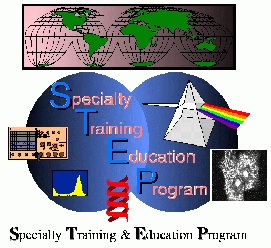


[Introduction to STEP]
[Specialty Areas]
[STEP Committee Members]
[Search for Keyword]
Plant Cell Studies
Flow Cytometry Facilities Department of Plant Sciences 303A Forbes Building University of Arizona Tucson, Arizona 85721Laboratory Profile
Head: David W. Galbraith, Ph.D.
1. Facilities: My research space consists of two laboratories occupying 2,000 square feet. One is a general biology laboratory and the other is a laboratory housing analytical equipment including flow cytometric instrumentation. Separate facilities are available for photography, media preparation, and plant and cell growth.
2. Instrumentation:
Flow cytometry: EPICS Elite with air cooled argon, and He-Ne lasers. Also available is an EPICS 753 equipped with a dye laser. Both instruments come with standard and large flow tips.
Other major items: fluorometer, HPLC, spectrophotometer, tabletop ultracentrifuge, light microscopes with standard and CCD (Photometrics) camera systems, PCR cycler. My laboratory is also equipped with all standard instruments for research in cell and molecular biology, such as refrigerators and freezers, centrifuges, incubators, electrophoresis equipment, laminar flow hoods, water purification equipment, water baths, balances, fraction collector and gradient former, CO2 incubators, UV transilluminator and Polaroid camera stand, Speed-vac and pump.
Common use equipment includes Beckman ultracentrifuges and rotors and DNA sequencing equipment.
Computers and data analysis: All data analysis systems are PC-based; software includes Coulter Elite, MDADS, Phoenix; non-cytometry software expertise in CorelDraw, SigmaPlot, and various word processing programs. Full Internet connections with Gopher and Mosaic.
3. Specialization Areas: My laboratory is expert in the areas of: (1) flow analysis and sorting of plant cells and protoplasts, (2) large particle analysis and sorting, (3) analysis of plant genomes through flow cytometry, (4) digital signal processing applications in flow cytometry, and (5) the application of cell and molecular techniques in flow cytometry and cell sorting.
4. Special Opportunities: My laboratory is involved in routine techniques of plant cell and molecular biology, including plant tissue culture, plant transformation, protoplast preparation and regeneration, library construction, chimeric gene construction and analysis, subcellular fractionation, enzyme assays, DNA and RNA analysis, PCR applications, and gel electrophoresis and analysis of nucleic acids and proteins. We also have a program in molecular genetics involving the analysis of Arabidopsis thaliana , and in analytical chemistry involving the analysis of sterols. We have a large training program in plant-insect interactions sponsored by NSF.
5. Special Courses Offered: I have previously offered formal courses in Flow Cytometry and Cell Sorting. Currently, training is done through on-the-job interaction with myself or my laboratory personnel.
6. Graduate Program: No graduate programs are involved in my cytometry area.
7. Local Accommodations: Accommodation is seasonally priced. Cheapest local motels can be found at about $35-40 per night in the summer, rising to $55-60 during the winter. Some accommodation is within walking distance of the university.
8. Transportation: Tucson International Airport (TUS) is about 12 miles south of the University. Shuttle (Stagecoach lines) to the University costs about $12. Local bus transportation (SunTrans) is $1 per ride.
9. Cost of Internship: Costs will be charged for actual use of reagents and supplies, and for flow cytometry time at $25.00 per hour.
10. Communication:
David W. Galbraith Department of Plant Sciences 303A Forbes Building University of Arizona Tucson, AZ 85721 Phone: (602) 621-9153 FAX: (602) 621-7166 E-mail: dgalbrai@ccit.arizona.edu.
